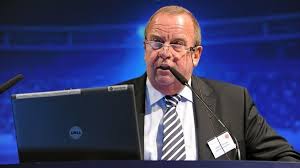By Andrew Warshaw
November 3 – As football’s stakeholders gather at FIFA headquarters today for the latest meeting to determine exactly when to stage the 2022 World Cup, FIFA’s leading medical expert has insisted once again that the Qatar tournament must not be staged in the middle of the Gulf summer.
Europe’s top leagues are firmly against any move at all from the World Cup’s traditional summer slot while the clubs, represented by the European Club Association, are set to propose a slight shift forward to April though this will most likely coincide with the Muslim festival of Ramadan and therefore might not be a workable solution.
Privately, ECA members recognise that because of both Ramadan and the subsequent festival of Eid, their April-May blueprint may not be acceptable to all parties.
As a result, mid-May to mid-June is rapidly becoming a more viable alternative option for causing the least disruption even though a switch to winter – either November-December or January-February – is FIFA’s preferred option, with Sepp Blatter favouring the former.
Harold Mayne-Nicholls, the FIFA-appointed expert who led the inspection team that examined the credentials of all nine candidates for both 2018 and 2022, has long believed May could work – with evening kickoffs after the sun goes down.
A final decision is not due until next spring but Michel d’Hooghe, head of FIFA’s medical committee, says one thing is clear: a switch of some kind is inevitable despite potential disruption to the international football calendar.
“I would prefer May rather than June into July, and evening kickoffs would certainly help but it’s not ideal. I’d rather have the tournament earlier in the year or later,” d’Hooghe told Insideworldfootball.
“Everyone is talking about different dates and there are pros and cons of all of them. But the most important factor is to avoid the hottest months. That would be very, very bad for the health of everybody. It would be absolutely contrary to the health of everybody – players, officials, press and fans. We need to do everything to avoid that.”
D’Hooghe doesn’t buy the argument that playing in summer would be no hotter than in some previous World Cups – including the United States and Mexico. “I don’t accept this reasoning,” he said. “Times have changed. In the past players played 30 matches a season, now they play 100.”
Although all parties are looking for progress at today’s talks in order to come up with the least painful compromise , it is clear there are still vested interests.
Despite being Blatter’s preferred option, any move to November-December would be fiercely resisted by the clubs. If the tournament does get switched to winter, they would call for January since most leagues, in Europe at least, have a winter break at that time as does the international calendar.
Last month, ECA vice president Umberto Gandini suggested the winter Olympics in the same year be switched to accommodate the World Cup.
International Olympic Committee officials immediately took umbrage but Gandini was merely raising the idea of shifting the winter Games by perhaps a couple of weeks rather than taking it out of its normal time slot. Besides, the dates for the 2022 winter Games have not even been dceided yet.
Gandini’s point was that playing the World Cup from, say, mid-January to mid-February would still protect the Olympics which could then be staged in March in order to avoid any clash though this, of course, may not find favour with international broadcasters.
Contact the writer of this story at moc.l1751587485labto1751587485ofdlr1751587485owedi1751587485sni@w1751587485ahsra1751587485w.wer1751587485dna1751587485

